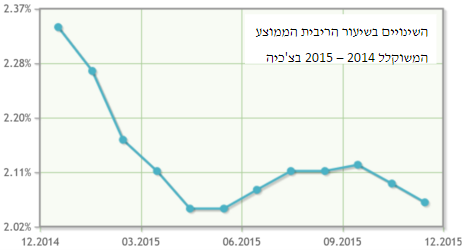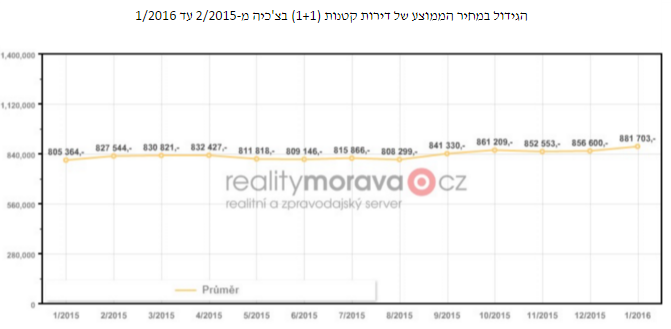Residential Real Estate Market Forecast in the Czech Republic for 2016

Introduction – General Overview
Czech Republic – Economic Forecast
The Czech economy is currently in a very strong position, with one of the highest growth rates in Europe. Numerous economic indicators for the Czech Republic show performance among the best in Europe (GDP, low unemployment, etc.). As it appears, the Czech National Bank will continue intervening to weaken the exchange rate of the Czech koruna (CZK) against the euro and the dollar, at least during the first half of 2016. This will support exporters, attract investors, and ultimately help the entire economy grow.
The mass immigration crisis is currently not significantly affecting the Czech economy, and there is no doubt that this will remain the case in 2016.
Czech Republic – Interest Rate Forecast
Following historically low mortgage interest rates in 2015 (discussed further below), a moderate increase is expected in 2016. However, due to intense competition in the Czech mortgage market, interest rates are expected to rise only slightly. A more significant increase is anticipated in 2017.
Forecast for the Residential Real Estate Market in the Czech Republic

The residential real estate market in the Czech Republic will remain in a very strong condition in 2016 and offer excellent opportunities for investors. Economic growth will be accompanied by rising prices across all types of residential real estate in the country. The most significant price increases are expected in Prague and Brno. Real estate developers in Prague are currently constructing many projects that will meet the continued demand for new housing in 2016.
The housing market in the Czech Republic remains divided into two distinct groups. The first group consists of the cities of Prague and Brno, where residential property sales have steadily increased for about five years. The second group is the rest of the Czech Republic, where there is little real residential development. In cities other than Prague and Brno, the real estate market mostly consists of older apartments (with no new construction).
According to Czech real estate experts, investing in real estate in Prague and Brno (especially in small apartments suitable for rental) is considered one of the safest forms of investment in the Czech Republic in 2016.
Economic Forecast for 2016
GDP
According to forecasts by the Czech National Bank, the country is expected to reach a GDP growth of 2.8% in 2016 and 2.9% in 2017. However, some public and private institutions estimate that growth in 2016 may exceed 3%.
Unemployment Rate
The good condition of the Czech economy will continue to contribute to reducing the unemployment rate in 2016. According to the Ministry of Labour and Social Affairs, the unemployment rate is expected to range between 5.7% and 6.1% in 2016.
Finance and Mortgages
The most likely development for the PRIBOR (interbank loan rate in Prague) is that it will remain at the same level as in 2015. This scenario is supported, for example, by the Czech Mortgage Bank and other financial institutions.
The Czech National Bank will continue to intervene in order to weaken the Czech koruna’s exchange rate at least during the first half of 2016. This will support exporters and ultimately benefit the entire economy.
Following the lowest mortgage interest rates ever recorded in 2015 (more details below), a slightly higher increase is expected in 2016. According to the leading Czech consultancy Fincentrum, this will be due to new legislation regarding client credit and VAT on land, which will come into effect in 2016 (read more at the end of this review). However, thanks to fierce competition in the Czech mortgage market, interest rates are expected to rise only slightly. A more significant increase is expected in 2017.
Real Estate Market
Overall, the outlook for the real estate market in 2016 is very optimistic. Economic growth will be accompanied by rising property prices. Leading developers are launching many residential projects to meet the ongoing demand in Prague and Brno. Investing in real estate, especially in Prague, is considered the safest form of investment in the Czech Republic.
Residential Real Estate Sector – Forecast for 2016
Brief Market Overview for 2015

The significant increase in demand for residential properties in 2015 was primarily driven by the ongoing decline in mortgage financing costs. Key factors contributing to better mortgage accessibility included favorable economic conditions, the policies of the Czech National Bank, and strong competition among mortgage providers.
Mortgage interest rates fell to nearly 2% annually in 2015. This led to a general increase in the purchase of residential apartments (including for investment purposes).
According to Jan Sadil, Chairman of the Board of the Czech Mortgage Bank, investment purchases accounted for about one-fifth of all residential apartment transactions in 2015. The Czech Mortgage Bank also estimated that the number of mortgage transactions increased by 29% compared to the previous year.
According to statistics from all major Czech real estate websites, residential property prices in the Czech Republic steadily increased in 2015. The highest price increase (9.3%) was recorded in small apartments (1+1 and 1+KK), which are the most desirable for investment and rental purposes. However, prices of mid-sized apartments also rose. The highest annual price increases were observed in the Prague and Brno regions.
The growing demand for new apartments (for personal use or investment) in 2015 will inevitably lead to continued development of residential properties in 2016 – but this refers only to Prague and Brno.
Click here to read our 2015 real estate forecast for the Czech Republic

Market Forecast for 2016
The high demand for residential apartments in 2015 is expected to continue in 2016. The main drivers of this trend are low mortgage interest rates and a very positive outlook for the Czech economy.
General Description of Trends in 2016
In 2015, mortgage interest rates reached historic lows, making housing purchases (for personal use or investment) very affordable.
Czechs who previously hesitated to buy a new apartment are now doing so. They are no longer afraid of mortgage-related debt. Thanks to positive expectations about the future of the economy, the average amount of housing loans in the Czech Republic continues to rise. People are now willing to take out larger mortgages instead of using their savings to buy new apartments. Investment apartment purchases are also currently a very safe form of investment since the average monthly rent is higher than the average mortgage payment.
According to the leading real estate news site realitymorava.cz, all signs indicate that in 2016 we can expect continued price growth across all types of residential apartments. Sellers are aware that we are in a period of high demand for residential apartments and are therefore offering prices that match this trend.
Real Estate Markets in Various Czech Cities in 2016
According to Marcel Soural, Chairman of the Board of the real estate development company Trigema, the Czech housing market is divided into two groups. The first group is represented by Prague and Brno, where residential real estate sales have steadily grown over the past five years. The second group is the rest of the Czech Republic, where there is no residential real estate development. Thus, real estate markets there are not growing.
Prague
According to forecasts by leading developers active in the Czech residential market, new apartment sales in Prague are expected to grow by 10% in 2016 compared to the previous year, amounting to between 6,500–7,200 new units. Leading developer EKOSPOL estimates the figure will be even higher – 8,000 units – citing demographic data in support of this estimate. According to the Czech Statistical Office, the number of people moving to Prague increased by 10% in 2015 compared to 2014.
The prices of new apartments are expected to continue rising in 2016. The CEO of Trigema attributes this ongoing growth to higher project and construction costs in Prague. He estimates that if 7,000 apartments are indeed sold this year, as forecasted, demand will exceed supply, placing strong upward pressure on prices across the residential market.
Brno
In 2015, the Brno real estate market experienced massive demand for small investment apartments. Over 60% of transactions for small apartments were for investment purposes. This caused prices to rise by about 10%. Brno continues to face strong demand for housing due to a persistent shortage of such apartments.
In the real estate development sector, Brno ranks second only to Prague. Developers are launching numerous projects to meet the high demand. Many apartments are sold well before construction is complete.
Other Cities in the Czech Republic
As mentioned above, there is no significant residential construction outside Prague and Brno in the Czech Republic. Therefore, residential real estate available in other Czech cities primarily consists of second-hand apartments, i.e., non-new units.
According to Czech real estate site statistics, the wide availability of mortgage loans in 2015 also led to a general increase in prices for these older apartments across all secondary cities. The estimated annual price increase for old apartments in the Czech Republic was 5–6% in 2015. This means, for example, an increase of several hundred thousand CZK in asking prices for three-room apartments in cities like Plzeň and Liberec. This trend of rising prices for old apartments is expected to continue in 2016. The only likely exception is Karlovy Vary, where demand has dropped due to the worsening economic situation among Russian buyers, who are the city’s main property investors.
Other Factors with Potential Impact on the Real Estate Market in 2016
Legislative Changes
The amendment to the Czech VAT Act, which has already entered into force, expanded the definition of certain types of land – including “land for construction.” Thanks to this change, more plots now fall under this category. Since transactions involving land for construction are subject to 21% VAT, many plots (which now qualify under the new definition) have become more expensive.
In spring 2016, the Consumer Credit Act is expected to change in favor of consumers. Clients will be allowed to repay their entire mortgage at any time without additional fees, and to repay one-fifth of the mortgage annually.
These two legislative changes may result in a slight increase in mortgage interest rates in 2016.
The Political Situation in Europe
The mass immigration wave experienced in 2015 had different effects across Europe. Countries such as Germany and Sweden received a large number of asylum applications, while others, like the Czech Republic, received only a small number. According to official statistics, the Czech Republic granted asylum to only 765 applicants over the past year, 20% of whom actually came from Syria. Even if the Czech Republic ultimately accepts the number of refugees allocated by the EU program (which Czech politicians have so far opposed), this number will still be small (1,863 refugees in 2016). In summary, immigration does not significantly affect the Czech economy and is definitely not expected to do so in 2016.
In general, economists agree that immigration will primarily benefit EU member states. Immigration can help promote economic growth, but it also opens the door to major political and social tensions within the European Union. Now, as Europe faces its third major wave of immigration in 15 years, EU member states are failing to present a united front on this issue. This casts serious doubt on the future stability of the European Union in the coming years.
According to leading Prague real estate agency Lexxus – the Prague residential real estate market is expected to grow in 2016 because investment purchases are considered a safe investment in light of the general instability in Europe.
Looking for investment real estate in the Czech Republic? Contact us





